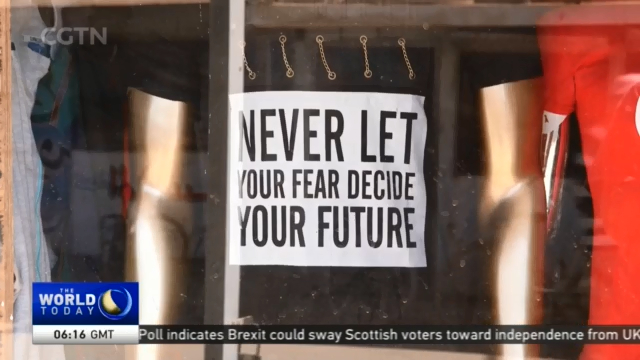
14:56, 03-Sep-2018
Syria Crisis: Jordan shuts gates on more refugees
Updated
14:50, 06-Sep-2018
02:21

As Syria and Russia threaten an offensive to retake control of northern Syria's Idlib Province, aid agencies warn the campaign will plunge the already critical refugee situation into deeper crisis. An estimated eight-hundred-thousand Syrians may be driven from their homes. But who will take them? Host countries, including Jordan, are turning refugees away. CGTN's Stephanie Freid reports from Jordan's Zaatari refugee camp on the policy to bar refugees and encourage others to return home.
Traditional Syrian wedding rituals, Performed by Syrian refugees living in Jordan's Zaatari refugee camp. The ritual goes with Ziad's wedding-themed shop opened at the camp months ago, not a great business move. When we last visited Zaatari in 2016, the camp's shop-lined quote un-quote "Champs Elysees" was buzzing, Now….
MOHAMMED, SYRIAN REFUGEE ZAATARI REFUGEE CAMP, JORDAN "By this time last year I had sold out of inventory. Now, nothing's moving. Nobody's buying."
Anticipating leaving, Syrian refugees are saving what little money they've got for their return home. That despite a June surge of tens of thousands of Syrians fleeing a bombing campaign in Daraa who amassed along Jordan's border hoping to get in. Jordan's government refused, saying: No more refugees. Period.
AYMAN SAFADI JORDANIAN FOREIGN MINISTER "We've hosted 1.3 million Syrians in our midst, that has come at a tremendous cost to our economy. The pressure for water, resources, the job market is enormous."
The stranded Syrians eventually returned home, fueling hope of return in the camp. So why open a wedding business when people are preparing to leave AND there have been no weddings in months?
ZIAD, WEDDING SHOP OWNER ZAATARI REFUGEE CAMP, JORDAN "We've lost a lot in our lives. The most important thing is to bring back joy whether inside or outside Zaatari. We're hanging onto joy."
STEPHANIE FREID, CGTN, ZAATARI REFUGEE CAMP, JORDAN.

SITEMAP
Copyright © 2018 CGTN. Beijing ICP prepared NO.16065310-3
Copyright © 2018 CGTN. Beijing ICP prepared NO.16065310-3